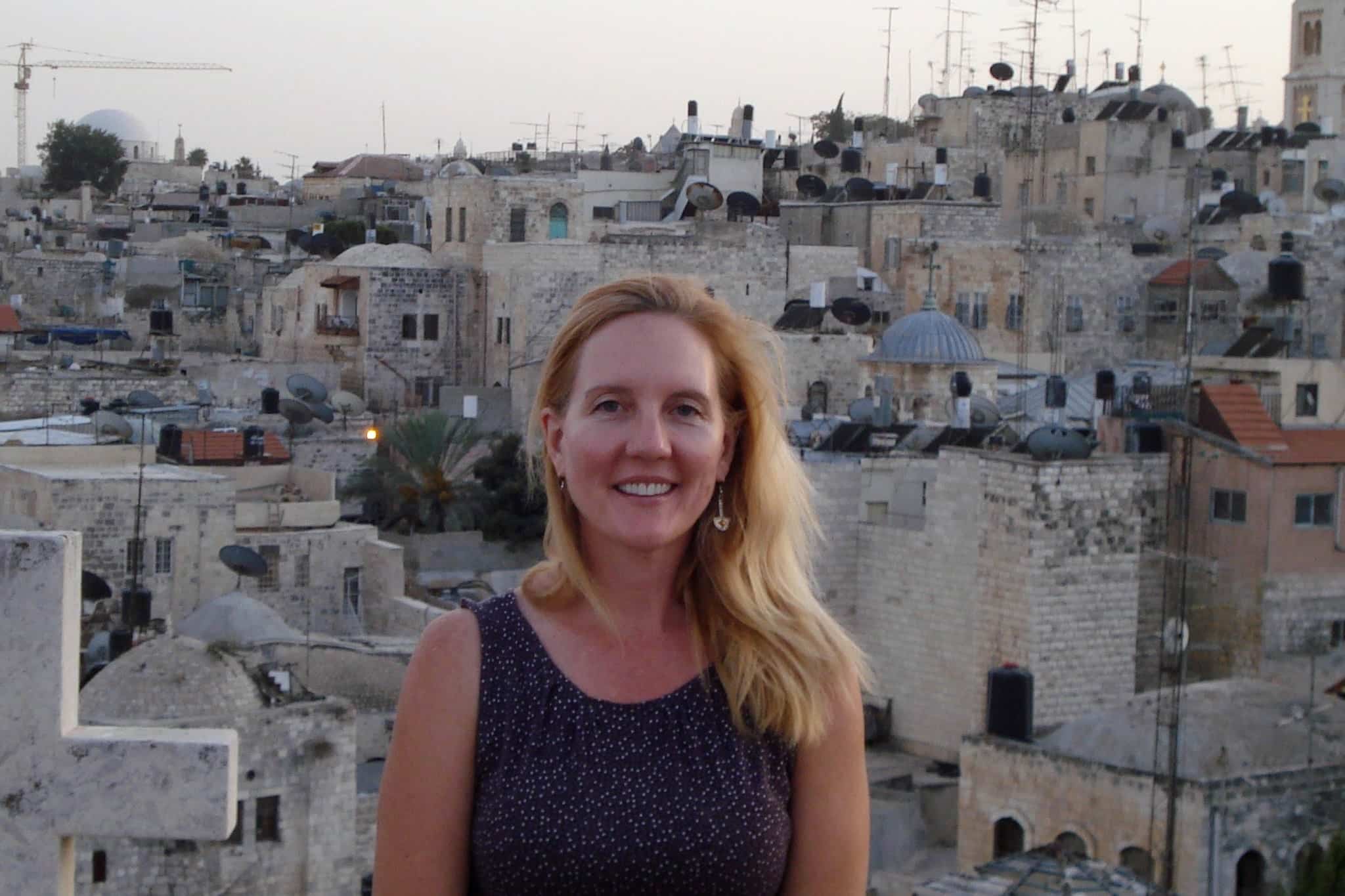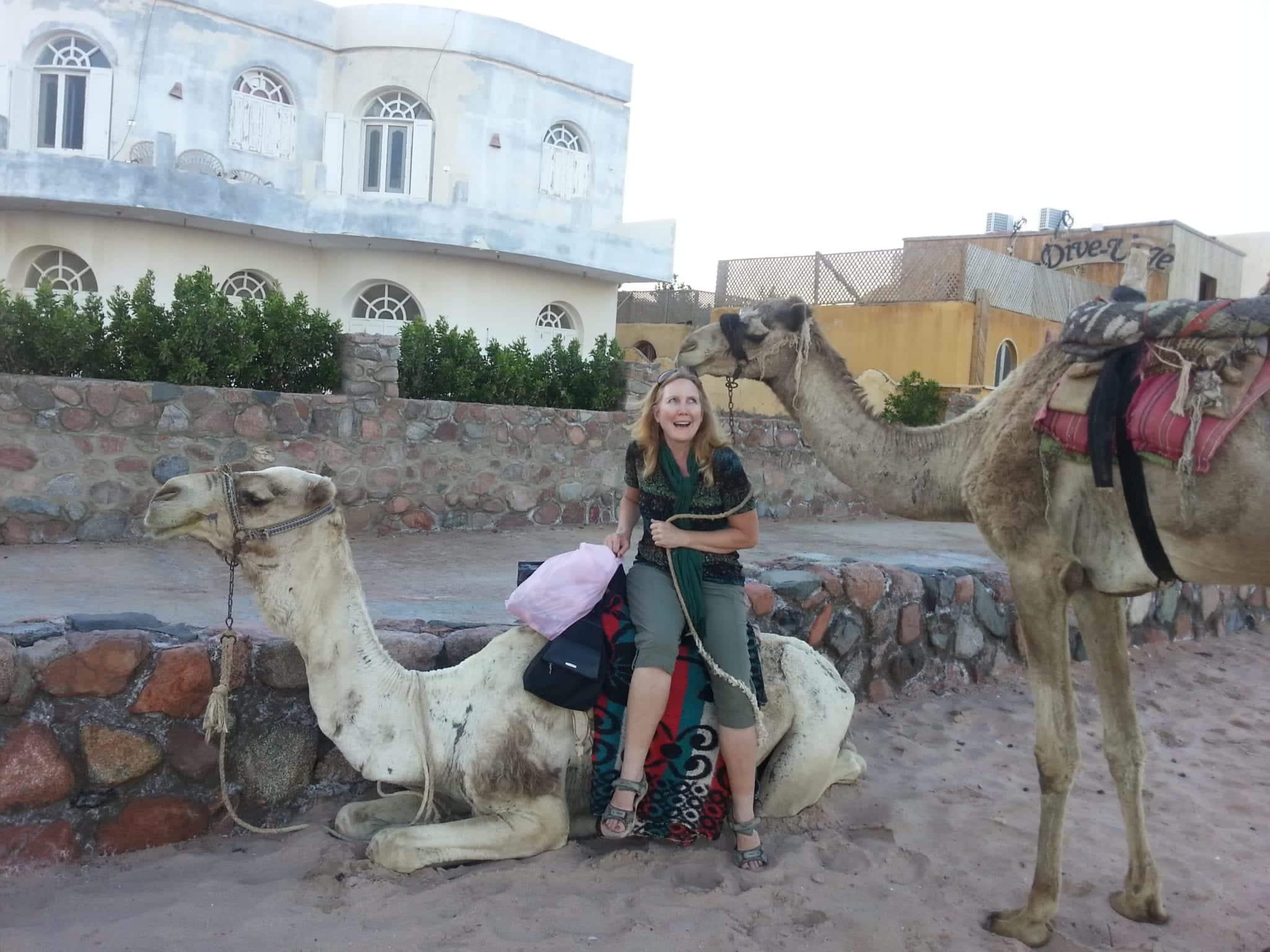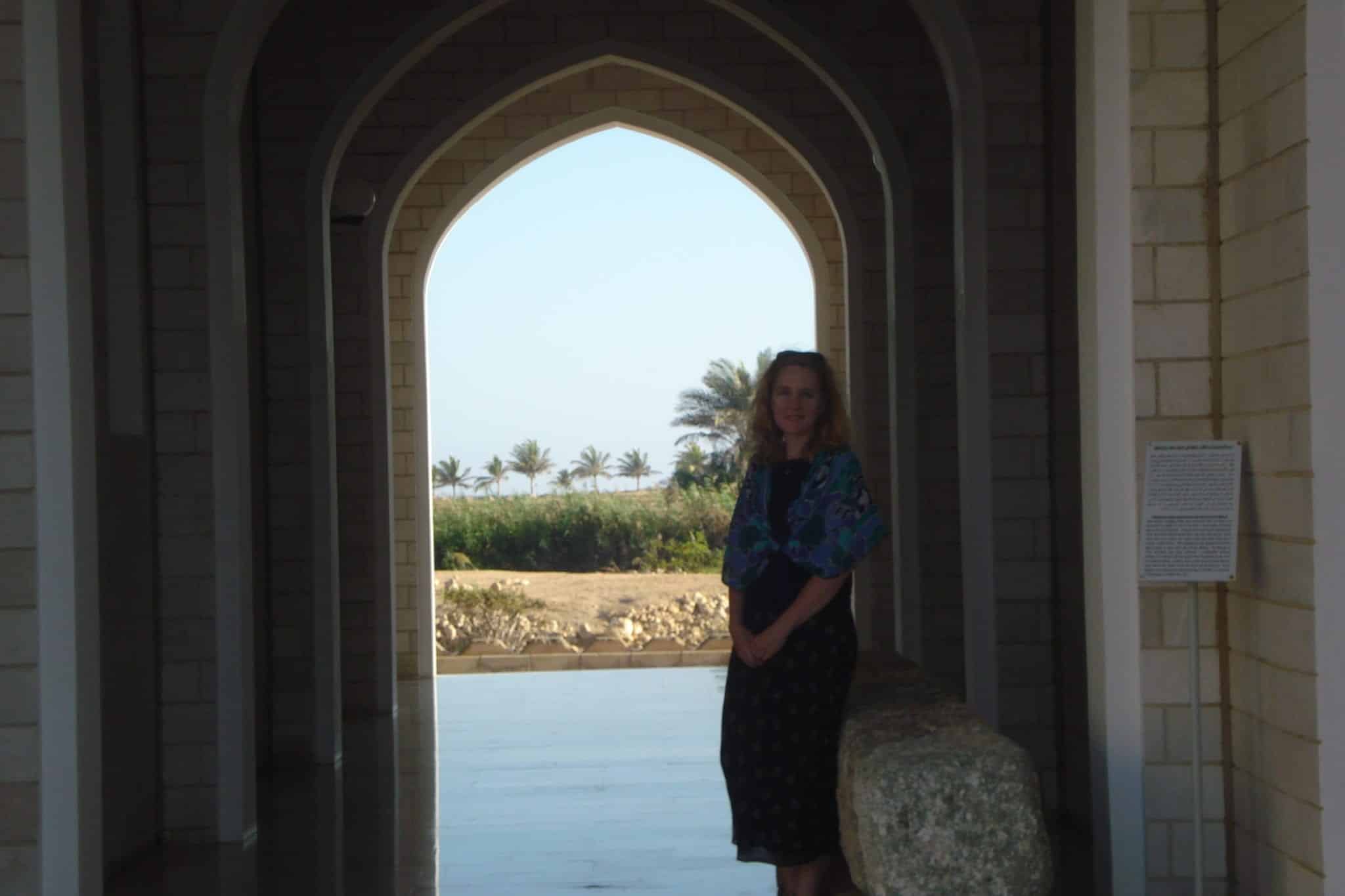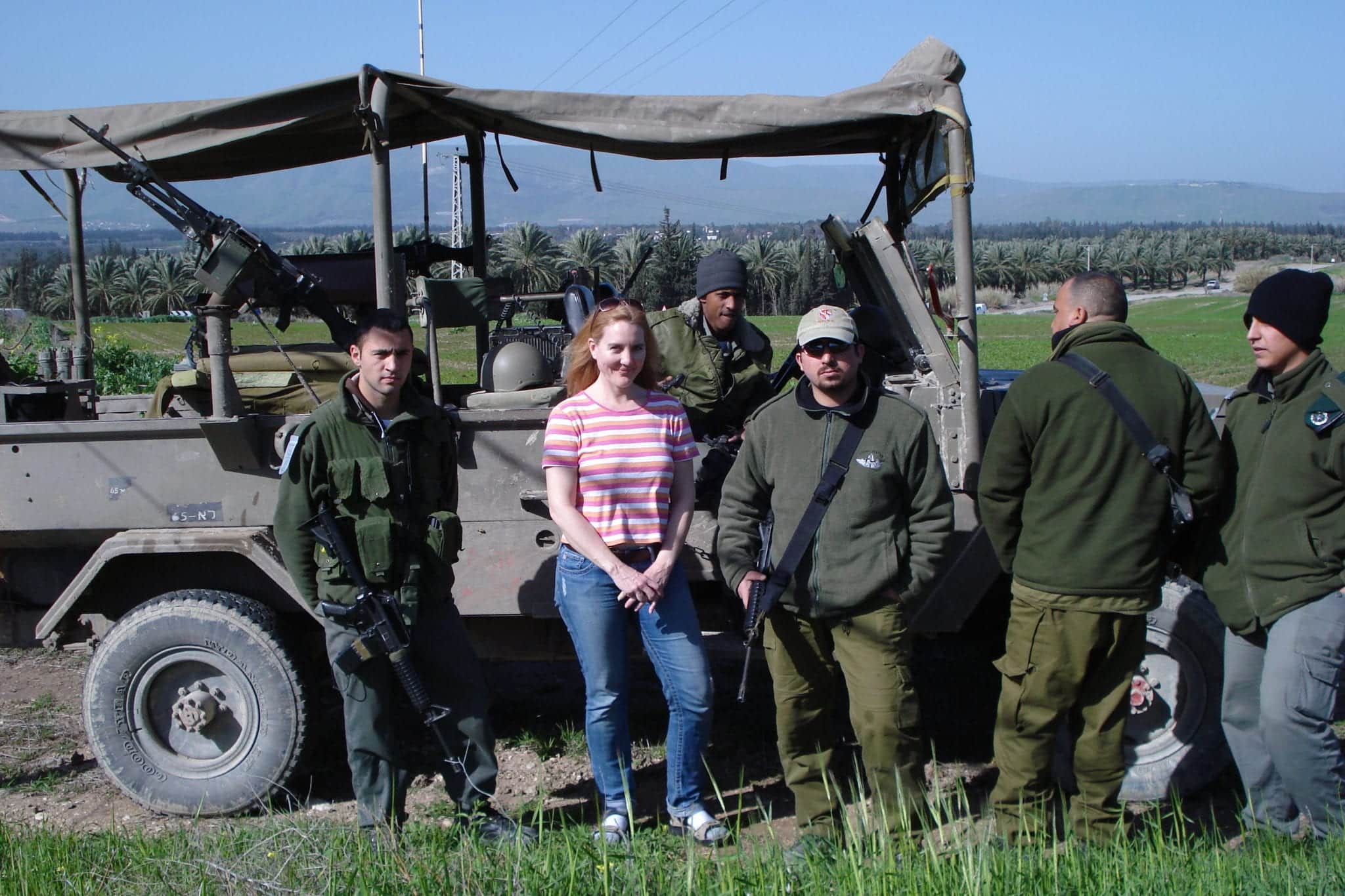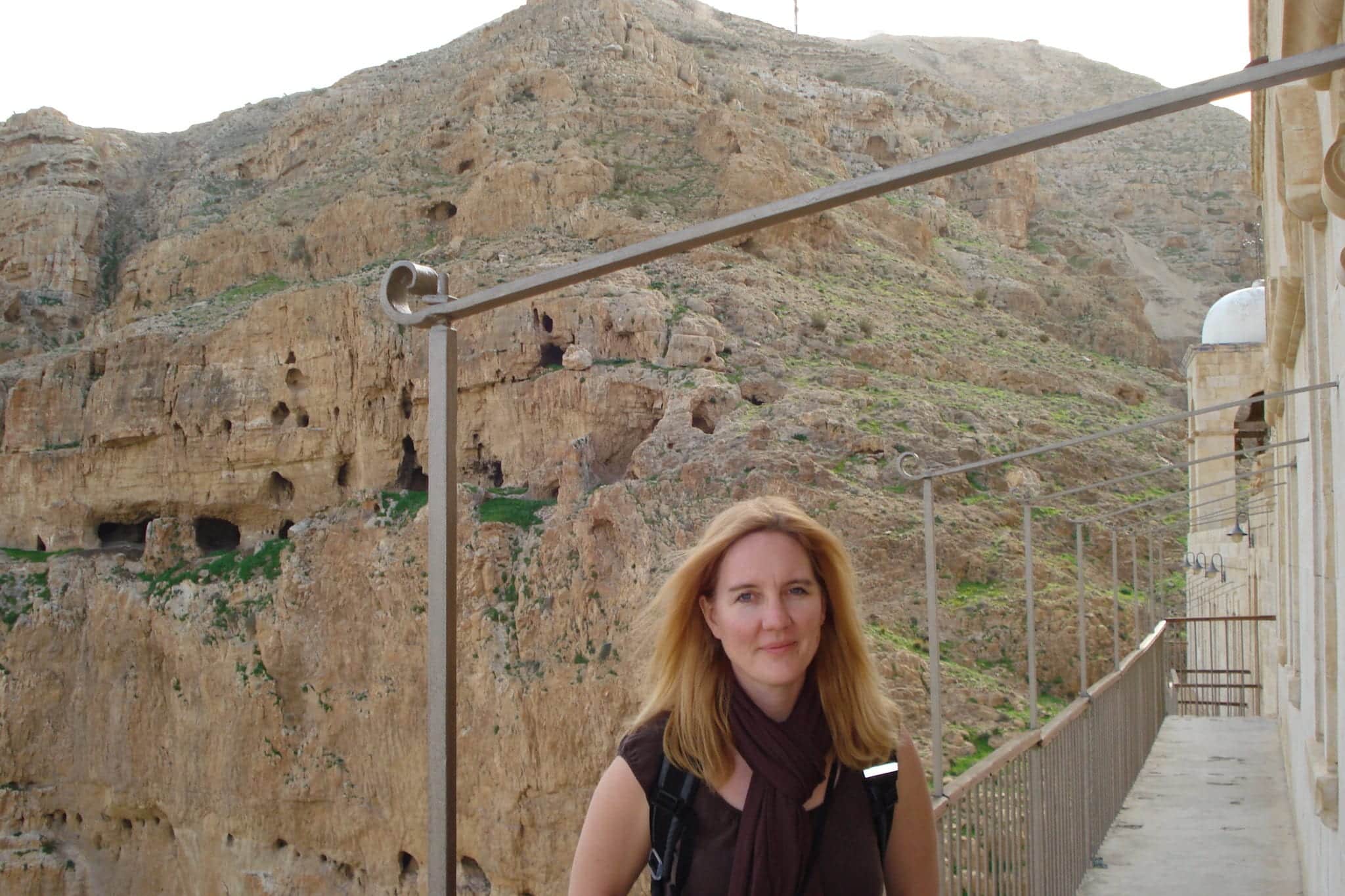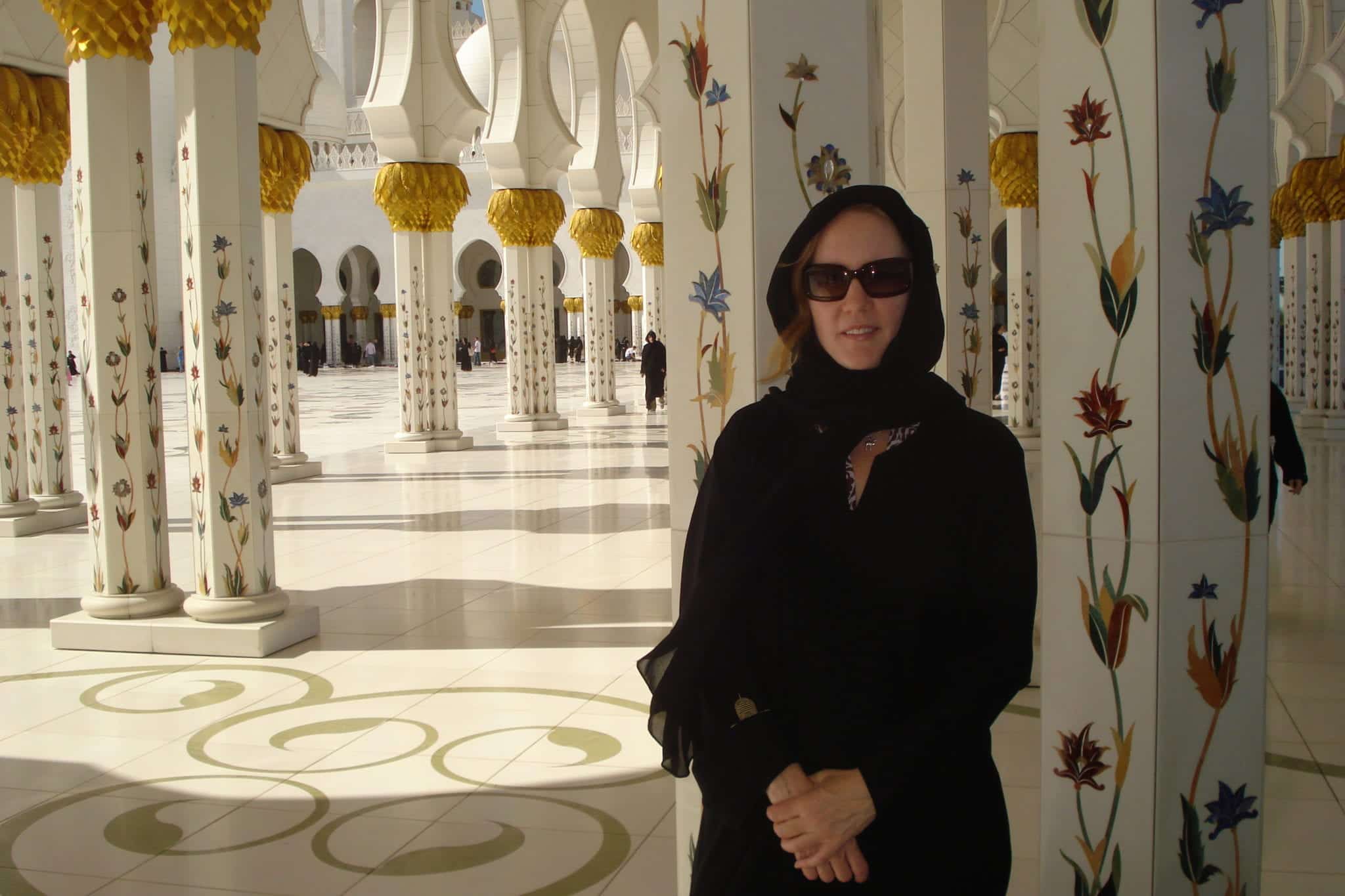Adventurous Kate contains affiliate links. If you make a purchase through these links, I will earn a commission at no extra cost to you. Thanks!
Is it safe for a woman to travel alone in the Middle East? It’s far safer than the media would have it appear, and with the proper planning and precautions, it can absolutely be safe.
For this piece, I decided to bring in an expert on solo female travel in the Middle East: Sabina Lohr, who has spent years living and traveling around the region on her own.
You’ve traveled extensively in the Middle East. What is it about the Middle East that brings you back again and again?
I love getting to know different cultures and, of the regions I’ve explored, Middle Eastern cultures fascinate me the most. People in the West tend to think of the Middle East as being a single entity, sort of a big blob, but traveling through its various countries extensively and living in three of them for a total of a couple of years has taught me that there are many, many different cultures and people within this region.
Talking to the people of these countries, getting to know their beliefs and becoming familiar with their lives is just thrilling to me. This region is I think the biggest cultural and religious leap away from my home country of America and its multitude of differences from the life and the people I’ve always known is compelling and completely intrigues me.
Where in the Middle East have you traveled?
I started out in Israel in 2008, which is not that many years ago but a lifetime ago in terms of what I’ve experienced and learned since then. I’ve traveled also to Oman twice and Qatar, Bahrain and Jordan once. I really wish I’d visited Syria before the war and hope to go there once it’s ended with a friend of mine who fled.
I also lived in the U.A.E. for three months, Egypt for about seven months and then Israel for about a year.
The Middle East is a region rife with stereotypes. Which of these stereotypes have you found to be inaccurate?
Most importantly the whole “the Middle East is dangerous” mentality is untrue. I feel safer most of the time in Mid Eastern countries than I do at home. They have problems there, of course, but they’re of such a different variety than in the U.S.
While sometimes in some Middle Eastern countries there is terrorism and war, this region does not suffer at all to the extent that we do from rapes, robberies, gun violence, home invasions and other crimes so common in the U.S. I think when people hear that the Middle East is dangerous they think that war and terrorism is piled on top other crimes like we see at home and that makes the whole region seem just impossibly dangerous. It is not.
Crime in the Middle East as a whole is low; there’s very little chance that you’re going to be a victim of terrorism or that anyone is even going to hurt you. The Mid East is safe. It really is.
How can women protect themselves when traveling in the Middle East?
Using the same common sense as when traveling in other foreign countries works. Don’t be careless, don’t totally trust someone you just met and don’t drink too much (contrary to common belief, alcohol and bars do exist in much of the Middle East). Be aware at all times that you’re in a world very different from your own, inside a culture comprised of people who think and behave very differently than you are used to. Dress modestly and behave respectfully.
I’ve found that in Persian Gulf countries there are rarely women on the streets alone. If you are alone in this region, you will likely be stared at quite a bit. While this might make you uncomfortable, just ignore it, keep moving and don’t worry that anyone will do anything more than stare.
If you go exploring alone anywhere in the Middle East, take a business card from your hotel or, if they don’t have one, get a staff member to write down the hotel’s address in Arabic with you as well as their phone number. If you get lost or end up with a taxi driver who can’t find your hotel, this can help.
How should female travelers dress in the Middle East? What do you recommend for packing, and do you recommend picking up different items?
Unlike most other countries where you can dress as you wish, you really need to dress more modestly in the Middle East, particularly in the ultra-conservative Persian Gulf. The people of this region don’t show as much skin as we do in the West, and we need to become more modest in dress while we’re in their countries.
Shorts and tank tops are out. Long, loose-fitting skirts are great, along with loose-fitting blouses with sleeves that at least cover your shoulders. Cover your cleavage. You can wear pants and even capris, as I do most often. In Israel you can wear whatever you want, even shorts and tank tops, except for Arab areas and religious Jewish neighborhoods, where you should cover up more.
Since the Middle East is usually very hot, one trick to keep you cool on a blistering day is to wear a sleeveless or short-sleeved shirt with a large scarf or pashmina draped over your shoulders. You’ll be covered up and cool at the same time. Also, importantly, if you’re going to be in this region when the weather is going to be very hot, wear clothes that do not show sweat. This includes blouses, pants and skirts. I learned this the hard way!
Have you found there to be a difference in how to dress and act in more touristy areas (i.e. Petra or spas catering to Western tourists on the Dead Sea) and more traditional areas?
Yes. If you’re going to be visiting the cities of Muscat, Oman, for example, or Manama, Bahrain, you need to be at your most modest, with a long skirt and your arms covered at a minimum past your shoulders. Following this rule in areas that cater to tourists, though, such as Dahab, Egypt; Petra, Jordan; or beach hotels anywhere, you will be unnecessarily overdressed.
In areas that see a lot of tourists you can really relax your dress and even pretty much wear what you do back home. I see women walking around Dahab every day in short shorts and sleeveless tops. This is acceptable to the locals, as they are used to seeing people dressed like this due to the number of tourists there. Even in ultra-conservative Sharjah, U.A.E., there were bikinis and speedos at beach hotels.
If you’re going to stay at a beach hotel or spend time in a town that has as almost as many tourists as it does locals, wear what you wish. Do still bring modest clothing, though, for your ventures into less touristy areas.
How has the Arab Spring affected the environment for international travelers?
It’s made the region more frightening to people, I think. While the Arab Spring began and ended about three years ago, images of violent protests still dance in many of our minds. Many Middle Eastern countries did not overthrow their governments during this period and even the ones that did are safe to travel to now.
Unfortunately, one country has been wiped off the travel map for the time being. Syria is off-limits to tourists until their Arab Spring, now a war, ends. Egypt has been undergoing a lot of change since they deposed their leader, twice, but it is in the process of recovering and is safe for tourists.
A positive aspect of the Arab Spring on travelers is the decrease in tourists it has brought to countries like Jordan and Egypt, where you can now be at a great advantage in negotiating down prices and enjoy seeing the sights without crowds. One example of the lack of crowds is the pyramids. The first time I visited the pyramids in 2009 before the Revolution, there were several hundred if not thousands of Western tourists walking around. The last time I went to the pyramids in February 2014, I saw a grand total of seven non-Egyptian tourists. Seven.
Being a female in a conservative region like the Middle East gives you the chance to get to know women intimately in setting where men wouldn’t be welcomed. Have you had any memorable experiences like these?
I’ve from time to time visited Bedouin women and children in their homes and one time discussed the topic of female genital mutilation, which is still practiced in this region. One woman told me that her experience with this was not bad at all, with all that was cut from her not amounting to more than the equivalent of a little bit of sand, she said. It was so fascinating to hear her version, so unlike the accounts of FGM we read about in the news. Maybe she was downplaying what happened to her or maybe it really wasn’t all that bad in her case; I don’t know. It is not a practice I agree with.
I do know, though, that the women of the Middle East do not appreciate the image many of us in the Western world have of them. These are strong and proud women, often educated and holding professional positions, not helpless, passive secondary citizens controlled by their men as many outsiders tend to think of them.
In fact, I’ve learned one way to tick off a Middle Eastern Muslim woman is to suggest that a man is forcing her to cover her head. Maybe in some countries, in some instances women don’t want to wear the hijab, but often they do. Often little girls can’t wait to grow up so they can cover up like the adult women do. Women covering themselves in the Mid East is not a product of male power and domination, rather it is their culture.
Do you recommend the Middle East for first-time solo female travelers, or do you recommend that they start somewhere easier first?
If you’re looking for lots of beautiful scenery, an amazing educational experience, tons of history and millennia-old archaeological sights, the Middle East is the right place to head. I have to say, though, it’s not the easiest region if you’re a Westerner who’s never traveled before. The cultures are just so very different from ours.
Also, the majority of the Middle East does not have a party environment, which is often something that first-time travelers are seeking. You can certainly travel to the Mid East as your first journey, but understand this is not the Western World. Study up on traveling in this region so you can have a successful and happy trip.
Which countries or regions in the Middle East would you recommend for a first-time traveler to the region or a first-time international traveler?
Definitely Israel and Jordan. They’re largely more progressive than other Middle Eastern countries and, therefore, don’t provide quite as much of a culture shock. The people are welcoming and friendly, modern conveniences abound and getting around by public transport is easy. Both Israel and Jordan offer excellent and safe introductions to the Middle East and will give you a positive first experience.
Which countries or regions in the Middle East would you recommend for more seasoned travelers?
I’d have to say Oman, Qatar and Bahrain, as these countries are extremely conservative in dress, behavior and overall culture, and you really should already have some experience dealing with other cultures before delving into these. Also, there are not a lot of Western tourists in these countries, so you will definitely stand out, which may not be comfortable especially as a woman traveling alone or even with someone else.
The U.A.E. can be done as a first-time traveler, especially if you stay in Dubai, where there are tons of Western expats and tourists, so you won’t feel uncomfortably conspicuous. Egypt is a must-see country but presents different challenges than the rest of the Mid East as it’s less developed and its people more emotional and lively than in neighboring countries, so they can be a little intimidating.
Get a little travel experience under your belt, and you will be able to enjoy Egypt, and all of the Middle East, more than you ever imagined.
Sabina Lohr is an American traveler who’s spent years living in and traveling through the Middle East. Through her experiences and the many friends she’s made, she’s learned invaluable information about the politics and various cultures of the region, which helps her in realizing that it’s not what you read in the news that truly makes the Mid East tick.
